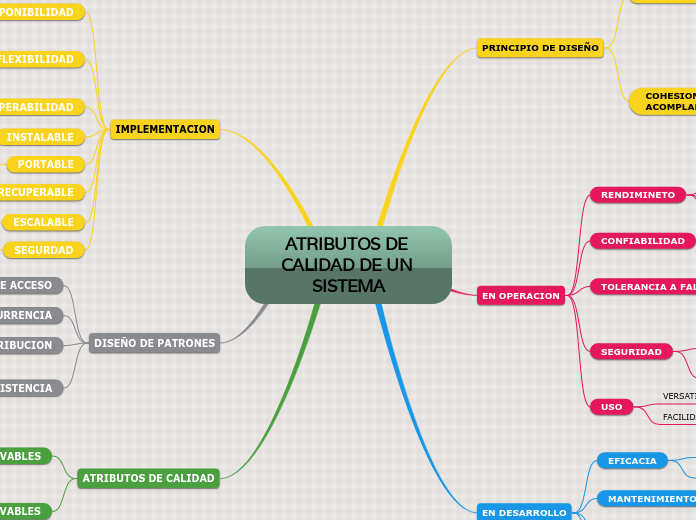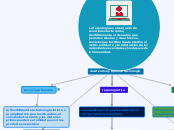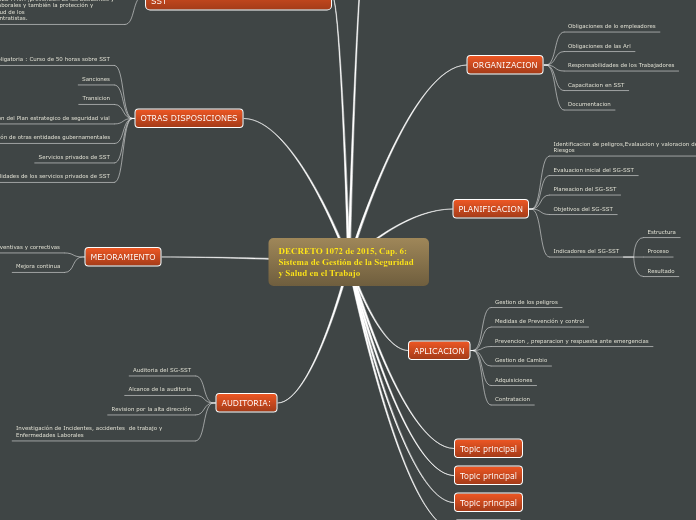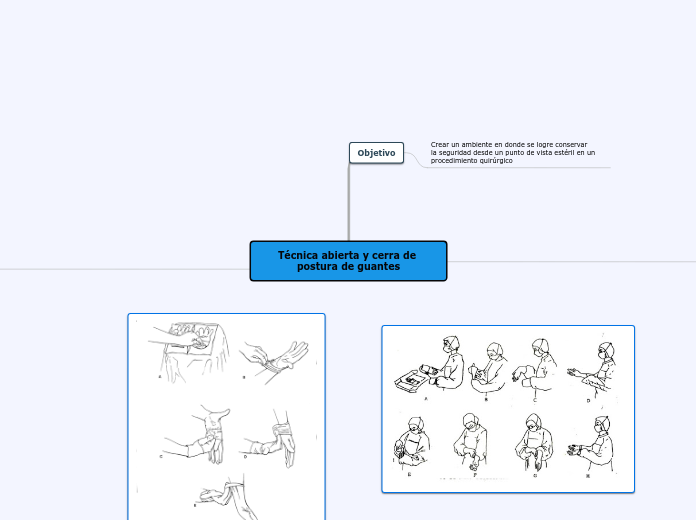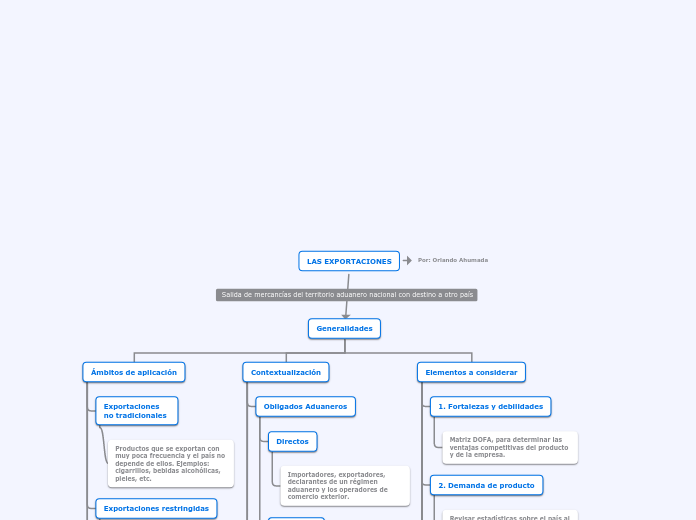ATRIBUTOS DE CALIDAD DE UN SISTEMA
The part of speech is a category to which a word is assigned according to its syntactic functions. In English the main parts of speech are noun, pronoun, adjective, determiner, verb, adverb, preposition, conjunction, and interjection.
ATRIBUTOS DE CALIDAD
NO OBSERVABLES
CUAN FACIL ES PROBARLO
CUAN FACIL ES INTEGRAR EL SISTEMA
OBSERVABLES
SI ENTREGA LOS RESULTADOS ESPERABLES
COMPORTAMIENTO DEL SISTEMA EN EJECUCION
DISEÑO DE PATRONES
A preposition is one of the most exciting parts of grammar. A preposition is used to describe the location of something in relation to something else.
PERSISTENCIA
Participle preposition consists of words that end in “ing”.
PROPIEDADES DE OBJETOS MODIFICABLES
LECTURA Y MODIFICACION DE ARCHIVOS
DISTRIBUCION
When a preposition consists of more than one word, it is called double preposition.
COMUNICACION DEL SISTEMA EN ENTORNOS DISTRIBUIDOS
CONCURRENCIA
Compound preposition consists of two or more words.
IMPLEMENTACION DE DISEÑO PARA UTILIZAR REALIZAR TAREAS PARALELAS
CONTROL DE ACCESO
When a preposition consists of one word it is called single or simple preposition.
CONTROL A LA HORA DE ACCESOS DE USUARIOS
IMPLEMENTACION
An interjection is used to express emotion in a sentence.
Think of other interjections!
SEGURDAD
NO AFECTA A PERSONAS O AL MEDIO
ESCALABLE
CAPACIDAD DE EXPANSION SIN GENERAR CAMBIOS ADICIONALES
RECUPERABLE
FRENTE A UN IMPREVISTO SE PODRA RECUPERAR
PORTABLE
DE FACIL TRANSLADO ENTRE EQUIPOS
INSTALABLE
INSTALACION DE SOFTWARE EN HARDWARE DE MANERA SENCILLA
INTEROPERABILIDAD
INTERCAMBIO DE INFORMACION CON OTROS SISTEMAS
FLEXIBILIDAD
CAPACIDAD DE ADAPTACION FRENTE A NUEVOS USUARIOS
INCORPORACION DE COPONENTES ESPECIFICOS
DISPONIBILIDAD
HABILIDAD DE ACCEDER AL SISTEMA EN OCACIONES DE NO ESTAR RESPALDADO
EN DESARROLLO
An adverb is used to describe a verb, but it can also describe an adjective or another adverb.
Adverbs normally help paint a fuller picture by describing how something happens.
VERIFICABLE
The intensifiers strengthen adverbs adjectives and adverbs and down- toners make them weaker.
CANTIDAD O COSTO DE LAS PRUEBAS
IDENTIFICACION DE FALLAS EN PRIEBAS
REUSO
POSIBILIDAD DE REUTILIZACION DE COMPONENTES
MANTENIMIENTO
EXPERIENCIA AGRADABLE FRENTE A CAMBIOS
EFICACIA
CAPACIDAD DE PROCESAMIENTO
USO DE RECURSOS GRATO
EN OPERACION
A numeral is a word or phrase that describes a numerical quantity.
Some theories of grammar use the word 'numeral' to refer to cardinal numbers that act as a determiner to specify the quantity of a noun, for example the 'two' in 'two hats'.
USO
FACILIDAD E INTUICION
VERSATILIDAD
SEGURIDAD
SE PUEDE MEDIR EN CANTIDAD DE ACTOS FALLIDOS DE ACCESO
EVITA EL INGRESO DE USUARIOS NO CALIFICADOS
TOLERANCIA A FALLAS
PORCENTAJE DE EVENTOS QUE CAUSAN FALLAS
PROPIEDAD DE REPUPERARSE ANTE UNA INTERRUPCION
CONFIABILIDAD
PROBABILIDAD DE OPERAR SIN FALLAS
RENDIMINETO
EJECUCION
PROCESAMIENTO DE INFORMACION
VELOCIDAD DE RESPUESTA
PRINCIPIO DE DISEÑO
A conjunction is a word like 'if' 'but' or 'and' which is used to connect sentences or clauses together.
COHESION ALTA Y ACOMPLAMIENTO BAJO
Subordinating conjunctions are conjunctions that are used at the beginning of subordinate clauses. Some examples of these conjunctions are: although, after, before, because, how, if, once, since, so that, until, unless, when etc.
SE TIENDE AL DESACOPLE DE MODULOS PARA NO GENERAR DEPENDENCIA
RELACION Y DEPENDENCIA ENTRE MODULOS
PERMITE CAMBIOS EN EL CODIGO
FOCALIZACION EN TAREAS ESPECIFICAS
MODULARIDAD
Coordinating conjunctions always connect phrases, words, and clauses. They are: for, and, nor, but, or, yet, so.
SELECTIVIDAD
DESCOMPOSICION DEL SISTEMA GENERANDO UN DISEÑO
DESIGNACION DE DESARROLLO A PERSONA O GRUPO DE TREABAJO
INTERFACE BIEN DEFINIDA
